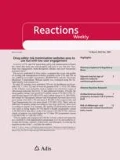Reference
Afzal I, et al. Ards? A case of methotrexate-induced acute pneumonitis. American Journal of Respiratory and Critical Care Medicine 195: no pagination (plus poster) abstr. 5576, 23 May 2017. Available from: URL: http://www.atsjournals.org/doi/abs/10.1164/ajrccm-conference.2017.195.1_MeetingAbstracts.A5576 [abstract] -USA
Rights and permissions
About this article
Cite this article
Methotrexate. Reactions Weekly 1667, 208 (2017). https://doi.org/10.1007/s40278-017-35339-1
Published:
Issue Date:
DOI: https://doi.org/10.1007/s40278-017-35339-1

